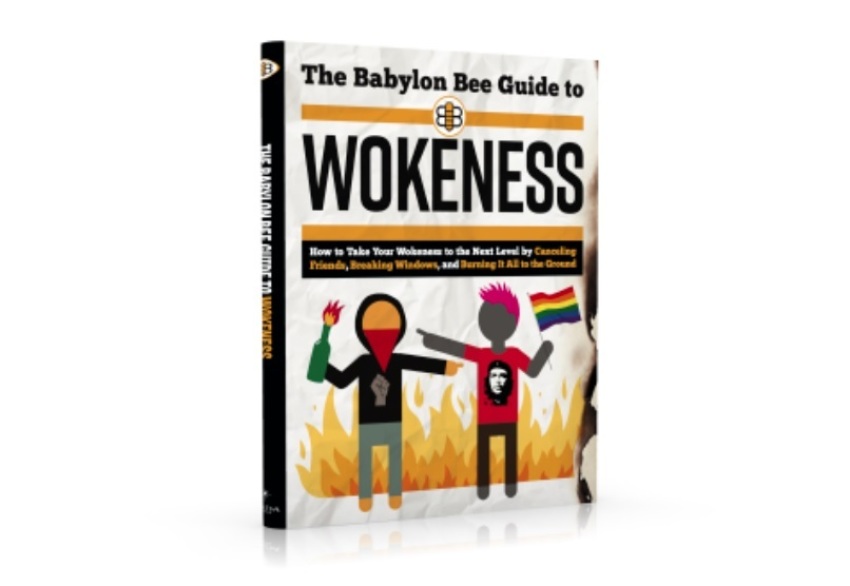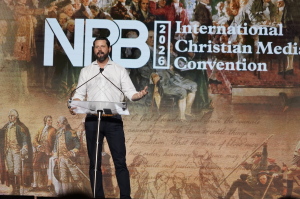Babylon Bee makes fun of the Left in newly released ‘Guide to Wokeness’

The minds behind the popular Christian satire site The Babylon Bee have released a new book that pokes fun at the ideas and actions of those who identify as “woke.”
The Babylon Bee Guide to Wokeness was released earlier this month as a satirical critique of woke ideology. The book was dedicated to communist dictator Joseph Stalin, whom it calls a “woke hero” and “champion of the oppressed proletariat.”
The book promises to help readers “take your wokeness to the next level by canceling friends, breaking windows, and burning it all to the ground.”
“Wokeness isn’t a private religion you can keep to yourself,” explains the introduction. “Once you see the world through woke eyes, you’ll never be the same, and you’ll never be able to stop telling your friends about your new beliefs. Kind of like when you join CrossFit or become vegan — or get an air fryer.”
The guide defines “woke” as “[f]inding your identity not in objective reality, but in your feelings,” “[w]orshiping the planet because humanity is evil,” “[f]inding the racism, sexism, and hatred in everything” and “[b]rainwashing your kids to hate life and be miserable.”
“Because you don’t want to raise a generation of happy, well-adjusted kids — that’s what NAZIS do,” the guide warns.

Babylon Bee Managing Editor Joel Berry, one of the guide’s authors, told The Christian Post about why they focused on wokeness, some of the book’s influences and if he believed woke ideology had any valid points.
Below are some excerpts from Berry’s interview with CP.
CP: Given that The Babylon Bee is known for sparing no one, why did you all decide to focus the book on woke ideology?
Berry: There are several reasons.
One of those reasons being it’s the prevailing conversation that’s been happening in our culture for the last couple years. And the ideology that undergirds it has become so much a part of our institutions, our universities, our churches, our corporate life, HR departments and the way we interact at work and then in the news cycle.
It’s just become such a pervasive ideology that we decided it warranted a more longer-form critique, Babylon Bee style.
So much about it is very low-hanging fruit for comedy.
There’s a lot that’s inherently funny about wokeness, and what was funny in writing this book is we found that we didn’t have to exaggerate wokeness all that much for it to be funny. We could present it in an overly honest way, and that alone created quite a lot of comedy.
CP: At one point in the book, you quoted C.S. Lewis’ classic book The Screwtape Letters. Did Lewis’ book also serve as an inspiration for how you wrote your book?
Berry: The interesting thing about what he did with The Screwtape Letters is he talked about how, well, it is a satirical work, but he really hated writing in the voice of a demon. He felt like it just wasn’t good for his spirit to be writing that.
We weren’t writing in the voice of a demon, but we were writing in the voice of a very earnest, maybe not very self-aware, woke person. So, in that sense, we kind of followed that format where we’re writing it from someone else’s perspective and explaining it as a woke person might explain wokeness to someone who wants to learn how to be more woke.
And so, we are very much inspired by writers like C.S. Lewis, G.K. Chesterton before him, other great satirists like Mark Twain. These guys were very prophetic in their understanding of the culture, what it was doing and where it was going, and we find a lot of wisdom in what they wrote. It helps us see our current moment a lot more clearly, as well.

CP: Although you have just released a book that pokes fun at wokeness, are there any aspects of woke ideology — be it Black Lives Matter, critical race theory, etc. — that might hold merit or have a level of validity?
Berry: I think that at its core, wokeness appeals to our better instincts or maybe our desire to be good people. And they do use seeds of truth to accomplish that.
For example, you talked about CRT or racial wokeness, for lack of a better term. It does use that kernel of truth that there was racism, prejudice and oppression in America’s past, and it kind of preys on everyone’s desire to make those historical injustices right.
Where it errs is it then takes that good and godly desire to right past wrongs and correct injustices and shoehorns in this very materialistic, neo-Marxist ideology that strips away the value and individual worth of humans, as made in the image of God. And instead, replaces it with this value based on a group identity.
It replaces original sin with whiteness. It replaces individual sin with systemic sin and systemic injustice. And in that sense, it kind of pulls people’s attention away from where the Gospel wants our attention, which is on the sin of our own heart.
Jesus is a great example, where He appeared to what was essentially a politically and socially oppressed minority when He came and lived as a Jew and appeared to the Jews. The Jews wanted a revolutionary liberator who would throw off the oppression of the Romans and correct all of these political injustices that they were experiencing. But instead, Jesus came and talked to them about the sin that was in their heart. And that rubbed a lot of people the wrong way. I think that rubs all of us the wrong way.
People on the left and people on the right are both guilty of this. Everyone wants to take this person of Jesus and turn Him into the avatar of whatever their preferred political ideology is. Right-wingers want a right-wing Jesus and left-wingers want a left-wing Jesus. When you look at Jesus honestly, as He presents Himself in the Gospels, Jesus is not as easy to pin down as we might like, and He kind of has a way of cutting past all of our partisan divides and speaking directly to the sin that’s in our hearts. And He’s going to say stuff that’s going to tick people off on both sides.
Part of our critique of wokeness is what it tries to do to Jesus in turning Him into a political liberator instead of the Savior of the world who came to save us from our sins.
CP: What do you hope readers take away from your book?
Berry: I hope it works on two levels.
I hope people can come away with a better understanding of what wokeness is. In spite of the silliness of our book, we did read the critical theorists and the peer-reviewed papers and try to really make sure that we were understanding and properly defining what we were critiquing.
And on a different level, we hope it just works as a laugh riot for people. There are a lot of really silly illustrations, silly diagrams.
It’s an easy book to just pick up and find something fun in.
In addition to informing people about wokeness, we hope it entertains. We hope it helps people to laugh a little bit and kind of lighten up about this crazy situation our culture is in. There’s a lot to laugh about, and it’s not always good to be despairing and handwringing over the way we feel our culture is going.
Sometimes, laughter is warranted and it’s a healing thing.



























